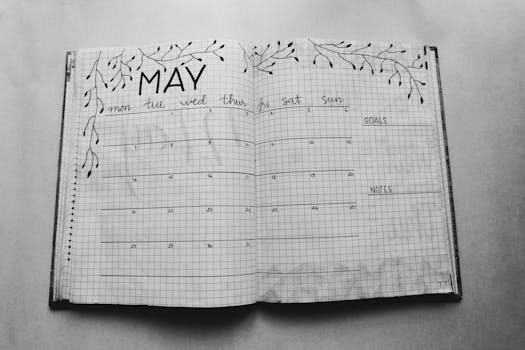How to Maintain a Consistent Journaling Routine: Techniques and Ideas for Self-Improvement and Personal Growth
Lifelong learning is all about growing and improving yourself every day. It helps you feel happier and more fulfilled. By learning new skills or trying out hobbies, you can boost your well-being. This guide shows you how to maintain a consistent journaling routine, which is a simple way to support your journey of self-improvement.
How to Start a Journal: Laying the Foundation for Consistency
Key Takeaway: Starting a journal is about choosing the right tools and setting clear intentions for your writing journey.
To begin journaling, you first need to understand the basics. Journaling is a simple act of writing down your thoughts, feelings, and experiences. It can help you reflect on your life and track your personal growth. To start, you need to choose the right journaling tools. This could be a notebook that feels good to you or a digital app if you prefer typing. Pick something that you will enjoy using (because who wants to write in something boring?).
Next, set clear intentions for your journaling. Ask yourself: What do I want to achieve with my journal? Do you want to document your daily life, express your feelings, or reflect on your goals? Understanding your purpose will help you stay focused and consistent. For example, if your goal is to reflect on your day, you might choose to write every evening for a few minutes.
Now, let’s dive into some beginner-friendly tips. Start small. You don’t need to write pages every day. Instead, aim for just a few sentences. You can also create a dedicated time and place for journaling. Maybe it’s every morning with your coffee or each night before bed. Consistency is key (like brushing your teeth, but hopefully more enjoyable).

Creative Journaling Ideas and Techniques for Sustained Engagement
Key Takeaway: Keeping your journaling routine fresh makes it easier to stick with it.
To maintain a consistent journaling routine, you need to keep it exciting. Explore different creative journaling ideas and techniques. One popular method is bullet journaling. This method combines planning and journaling in a fun and organized way. You can use symbols, colors, and lists to track your tasks and moods.
Another option is art journaling. This approach allows you to use drawings, paintings, and collages alongside your writing. It can be a great way to express yourself and make journaling more visually appealing. If you’re more tech-savvy, consider digital journaling. Many apps let you type, add photos, and even record audio. This flexibility can help keep your journaling routine engaging.
Try themed journaling, too. For example, dedicate one day a week to a specific theme, like gratitude or goals. This can help you focus your thoughts and make writing feel less overwhelming.
Journaling Prompts for Beginners: Overcoming Writer’s Block
Key Takeaway: Using prompts can spark creativity and help you overcome writer’s block.
Sometimes, you might feel stuck when trying to write. This is where journaling prompts come in handy. They are questions or statements that help you think about what to write. Here are some journaling prompts for beginners to get you started:
- What made me smile today?
- What is one goal I want to achieve this month?
- How do I feel right now, and why?
- What is something new I learned recently?
- Who am I grateful for today, and why?
You can use these prompts to direct your writing. Just pick one and let your thoughts flow. Don’t worry about grammar or spelling; focus on getting your feelings and ideas on paper.
Remember, journaling should feel good, not stressful (like trying to solve a math problem after a long day). If a prompt doesn’t resonate with you, feel free to skip it. The goal is to encourage self-reflection and personal growth.

Additionally, consider exploring self-reflection techniques to enhance your journaling experience and prevent burnout. If you want to enhance your experience, consider exploring the benefits of journaling for your emotional well-being. Additionally, maintaining a study progress journal can significantly improve your focus and achievements.
Journaling Habits for Self-Improvement and Goal Setting
Key Takeaway: Develop journaling habits that support your self-improvement and help you track your goals.
Journaling can be a powerful tool for self-improvement and goal setting. To make the most of it, create journaling habits that align with your personal growth. Start by setting realistic goals. Instead of saying, “I want to change my life,” try a more specific goal like, “I want to read two books this month.”
Once you have your goals, write them down in your journal. Break them into smaller steps. For example, if your goal is to read more, you could set a goal to read for 15 minutes each day. Track your progress by writing about what you accomplished each week. This habit will help you stay motivated and see how far you’ve come.
Additionally, consider setting a weekly review session. Each week, spend some time reflecting on what went well and what could improve. Ask yourself questions like, “What did I learn this week?” or “What challenges did I face?” This practice can help you gain insights into your growth journey.
Actionable Tips/Examples: Implementing a Successful Journaling Routine
Key Takeaway: Create a practical journaling schedule that fits your lifestyle for long-term success.
To implement a successful journaling routine, you need practical advice that fits your busy life. Start by creating a journaling schedule. Block out a specific time each day or week dedicated to journaling. This way, it becomes part of your routine, like eating lunch or brushing your hair (a must-do!).
You can also draw inspiration from well-known personal development enthusiasts. Many personal growth authors like Oprah Winfrey and Tim Ferriss swear by their journaling practices. They often write about their thoughts, goals, and daily reflections. Take a page from their book (pun intended!) and adapt their habits to your style.
Flexibility is essential in maintaining your journaling practice. Some days, you might feel inspired to write a lot, while other days, you may just jot down a few thoughts. Allow yourself to adjust and adapt to your feelings. Remember, it’s about the journey and not about perfection.

FAQs
Q: How can I integrate journaling into my daily routine without it feeling like a chore or overwhelming my schedule?
A: To integrate journaling into your daily routine without it feeling like a chore, set aside just 5-10 minutes each day at a consistent time, such as in the morning or before bed. Focus on writing a few sentences about your thoughts or experiences, rather than aiming for lengthy entries, to keep it manageable and enjoyable.
Q: What are some creative journaling techniques or prompts that can keep me engaged and motivated to write regularly?
A: Some creative journaling techniques include using visual prompts, such as doodling or collage, to express your thoughts, or incorporating themed entries, like gratitude lists or daily highlights. You can also try writing from different perspectives, such as a letter to your future self or a conversation with a fictional character, to keep your writing fresh and engaging.
Q: How can I use journaling as a tool for self-reflection and personal growth while ensuring that I maintain consistency?
A: To use journaling as a tool for self-reflection and personal growth, set aside a specific time each day or week to write about your thoughts, feelings, and experiences. To maintain consistency, establish a routine, use prompts to guide your entries, and create a comfortable writing environment that encourages openness and honesty.
Q: What strategies can I adopt to effectively set and track my goals through journaling, and how can this practice aid in developing a sustainable habit?
A: To effectively set and track your goals through journaling, adopt the SMART criteria (Specific, Measurable, Achievable, Relevant, Time-bound) to define clear objectives, and regularly review your progress in your journal. This practice can aid in developing a sustainable habit by fostering self-reflection, accountability, and motivation, leading to a more structured approach to achieving your goals over time.
